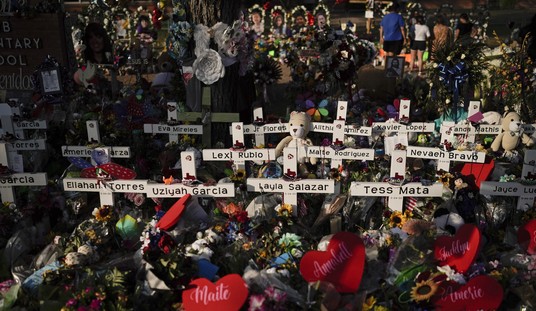True to Orwellian form, it’s only because they now have a proper emergency on their hands in the form of mass unrest that the law is being rescinded.
The reforms were promised Saturday by President Bashar al-Assad but had yet to be articulated until Tuesday, when the government announced the repeal of emergency law in place since the Baath Party seized power in Syria in 1963. The repeal must still be approved by parliament or Mr. Assad, but that amounts to a formality. So does its true impact: The government has yet to show any real sign of easing its relentless grip.
Since the uprising began, the government has vacillated between crackdown and suggestions of compromise, a formula that proved fatal for strongmen in Tunisia and Egypt. But the combination Tuesday was most remarkable for how divergent it was. Even as protesters buried those killed in Homs, the long-promised reforms ostensibly granted civil liberties, curbed the power of police and abolished draconian courts. It legalized peaceful protests — coded language for those approved by the government — as the Interior Ministry warned in a statement carried by the official news agency that it would bring to bear the full breadth of the law against any other kind.
So then, big changes ahead now that the emergency law is gone and demonstrations are freely permitted? Of course not: Some 20,000 protesters tried to stage a peaceful sit-in in the city of Homs this morning and were promptly fired on by security forces. Four were shot dead, adding to the total of more than 200 killed by Assad’s troops over the past month. Frankly, I’m surprised it’s that “low”; either he’s far more restrained than his dad was or his security apparatus isn’t as gung ho to mow people down as it used to be.
Assad’s strategy thus far has been stick-and-carrot, killing protesters here and there to warn them off while offering token reforms (like reshuffled cabinets) to appease them. Lifting the emergency law would be a major concession if it’s for real, but no one’s sure if it is yet. There’s some question of whether the law’s been rescinded or whether there’s merely been a proposal drafted to that effect, and U.S. diplomats note that under the new law that’s replacing it, protesters would still be required to receive official permission from the regime before demonstrating. Not so change-y. At WaPo, Jackson Diehl wonders why The One isn’t making more of a fuss:
Mass shootings of civilians by security forces are becoming a near daily event in Syria. In the southern town of Daraa, where the protest movement began last month, there have been multiple massacres, including one on April 8 in which gunmen opened up on a crowd marching with olive branches, killing 27. There have been similar episodes in the city of Banias and in several nearby villages. And these are just the ones that human rights groups have been able to document…
Yet the response to Assad’s bloodshed has been limited to rhetoric. President Obama called the shootings in Daraa “abhorrent” and a White House statement said last week’s attack on Banias was “outrageous.” But the administration has refrained from taking even diplomatic measures to express its dissatisfaction, such as withdrawing the U.S. ambassador in Damascus. It has failed to bring Syria’s case before the UN Human Rights Council–not to speak of the UN Security Council…
[W]hen faced with extraordinary human rights crimes–the repeated gunning down of unarmed protestors–the Obama administration remains passive. At first this response was puzzling. Then it looked badly misguided. Now it has become simply unconscionable.
“Syria, mind you, is not a friend of the United States,” notes Diehl, which is true but doesn’t address the real dilemma. There’s no question that Syria is an enemy and that Assad is a monster; the question, as (almost) always in the Middle East, is whether he’s better than what would succeed him. For a stark, surreal illustration of that point, read this LA Times piece from last month about how even Israel is nervous about what might come next in Damascus. At first glance, that seems almost impossible to believe — Assad is an Iranian crony, after all, and was responsible for building a nuclear reactor attacked by Israel in the recent past — but when the alternatives are a “civil war, an Iraq-style insurgency or an Islamist takeover by the Muslim Brotherhood,” it makes more sense. “Officially it’s better to avoid any reaction and watch the situation,” said one Israeli general, fearing further instability. I think Obama’s following the same logic in light of the lessons he’s learned over the last few months, with the Egyptian revolution going as badly as skeptics expected and the Saudis still angry at him for having abandoned Mubarak. He probably figures he’s better off going easy on Assad in order to (a) repair the breach with Riyadh, which is still the main regional bulwark against Iran, (b) avoid blame for whatever chaos ensues if he pressures Assad and the regime falls, and (c) build some gratitude from Assad in case he holds on, which might eventually be used to entice him away from Iran. It’s a rotten calculus, but that’s all the region ever is — painful choices with bad and worse outcomes.
In lieu of an exit question, and considering how the protests seem to be gaining momentum, read this shrewd piece from last month’s Foreign Policy on how hugely regime change in Syria would shake the Middle East. It’s good news in the short term insofar as Iran’s influence in Lebanon and Gaza would be reduced, but if out-and-out war erupts between Syrian Sunnis and Shiites, it could touch off sectarian conflicts in Lebanon, Iraq, even Saudi Arabia. Gulp.
Update: See what I mean about learning lessons?







Join the conversation as a VIP Member